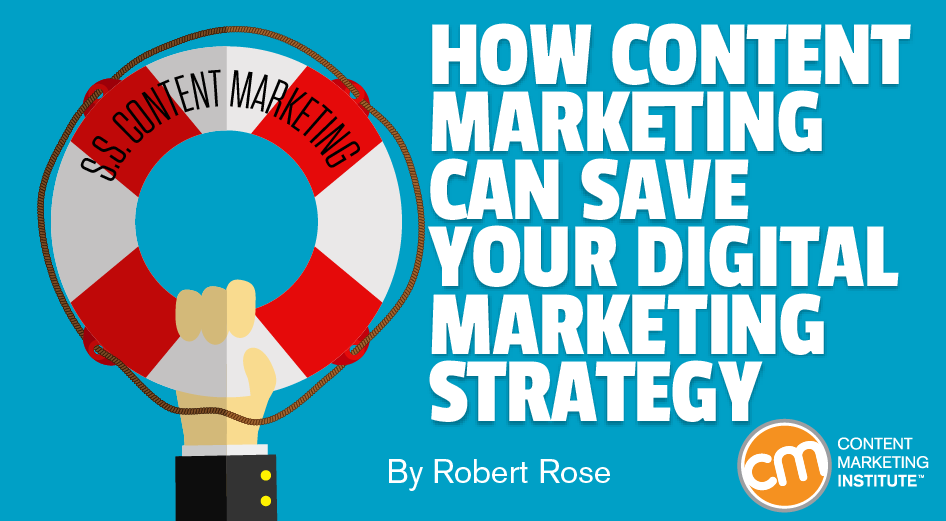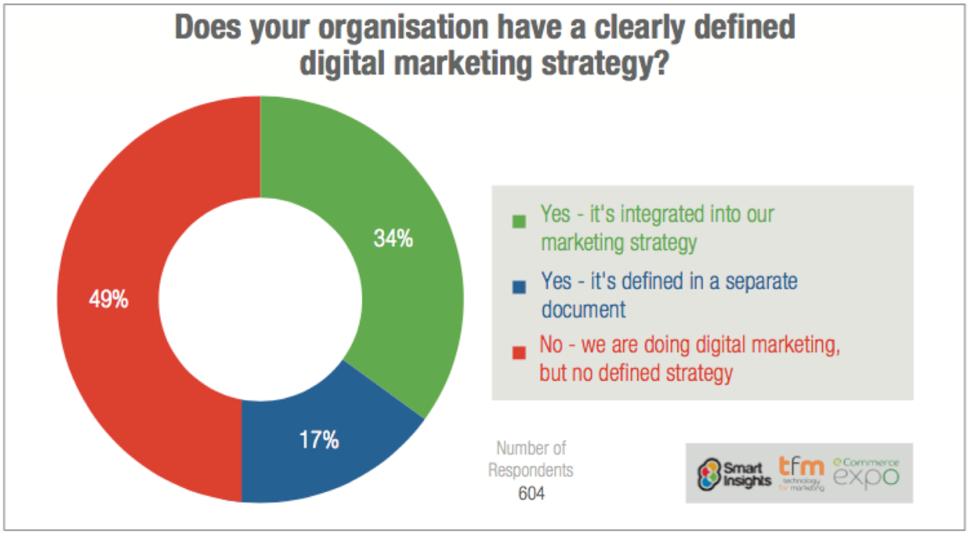Author: Robert Rose / Source: Content Marketing Institute

In a television series, this would be the beginning of the episode where we bring you up to speed on early character development moments you may have missed.
If you’ve tuned into the Content Marketing Institute for any length of time, you are no doubt familiar with the importance we place on the idea of developing a documented, strategic plan. Each year in our research, we find that a cohesive, documented strategy is one thing that separates successful vs. unsuccessful content marketers.
In the 2018 B2B research, 62% of the most successful content marketers have a documented strategy vs. 16% of the least successful.
One thing we’ve had to repeatedly clarify is that content marketing doesn’t simply replace your broader integrated marketing strategy. Many of the “content-marketing-is-dead” articles make the false assertion that we proposed businesses stop classic advertising, PR, cold calling, and all other forms of classic marketing in lieu of content marketing.
No.
Content marketing is, and has always been, best served as an integrated infusion into a broader marketing strategy – a multiplier. Content marketing is the opportunity to make everything we do better.
For many businesses, content marketing is but a small fraction of their overall integrated marketing, perhaps helping one aspect of a broader strategy. For other companies, it may be the vast majority of what they do. Your balance is uniquely yours as part of your strategy.
But, interestingly, I’ve started to see an increasingly larger opportunity for content marketers to play a true leadership role in that broader marketing strategy. Content marketing strategy can be the foundation for a nonexistent integrated digital marketing strategy.
Let me explain.
Today’s integrated marketing strategy isn’t
In 2017, I traveled more than 185,000 miles working with enterprises to operationalize nascent (or broken) content marketing strategies. In most cases, I noticed the one thing paralyzing their content marketing strategy was the lack of clarity for the broader digital – or integrated – marketing strategy.
“Tell me about your overall marketing strategy” is one of the first discussions I want to have as part of understanding where a new content marketing approach can help the best. And, time and again, the most common answer is something along the lines of “well, see, that’s one of our big challenges.”
I went through my 2017 client notes, and, over the course of the year, I worked directly with 30 companies. Of the 30 organizations, 19 were B2B and 11 were B2C or B2B2C. (I worked with two nonprofits that target consumers, so I put them into the B2C group.)
Now, while hardly scientific, here are some interesting observations. Of the 30 companies:
- 96% of the companies (all but one) said they were siloed and had an increasingly difficult time aligning their enterprise digital marketing efforts across products, channels, regions, or even functional areas (brand vs. PR vs. demand generation).
- 85% of the B2B companies and 60% of the B2C companies were “frustrated” because, while they were “doing a lot of digital,” they either didn’t have a cohesive strategy or digital was a separate effort and, ironically, often competitive with what other functional areas were working on.
- 56% (17 of the 30, mostly B2B) said their company had no current integrated digital marketing strategy where they could roll up a broader view of all the PR, paid media campaigns, social media efforts, lead nurturing, or content-focused platforms. The main reasons were threefold:
- They were siloed by channel and by function, and in the midst of “reorganization.” The idea of an integrated roll-up strategy was “evolving” (this was surprisingly common last year).
- They never developed an integrated approach – and don’t even really know what it would look like.
- They had a combination of both the first and second reasons.
My experience aligns somewhat with research on this topic. One recent study by Smart Insights found that only 34% of marketers felt their organization had a clearly articulated integrated digital marketing strategy. Almost half of the respondents said they were “doing digital marketing” without a defined strategy.

Another study (albeit a few years old) from Marketo found that more than a third of marketers don’t have a documented marketing plan.
What I find fascinating about all of this is that it may well explain why we see so much frustration in businesses finding their content marketing groove. If, as we believe, successful content marketing is best served as a multiplier to an integrated marketing strategy, it stands to reason that having an understanding of that marketing strategy would be an…
Audience Team
The digital audience insights you need to build, manage and market to your digital audiences.

